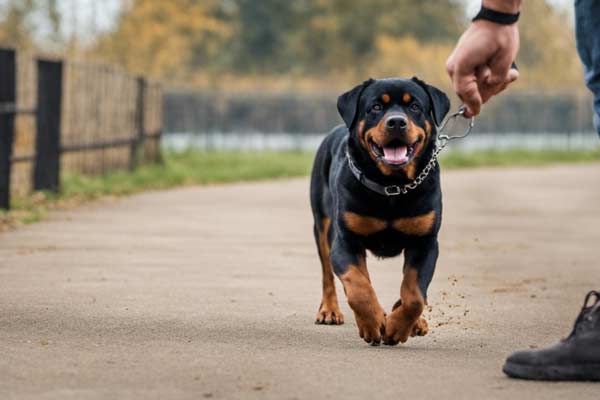Rottweilers, a dog breed with centuries-old origins in Germany, are renowned for their strength, loyalty, and intelligence, traits that were highly valued for working purposes.
Given these characteristics, people often inquire about the ease of training Rottweilers.
When it comes to training Rottweilers, there is a complex answer. Some Rottweilers are easier to train than others, depending on their temperament and personality.
However, Rottweilers are generally intelligent, eager to please, and readily trainable.
Understanding Rottweiler’s behavior is critical to effective training. Rottweilers are known for being independent and strong-willed, which can challenge training.
However, you can train Rottweilers to be obedient and well-behaved with patience, consistency, and positive reinforcement.
Start training Rottweilers early and ensure they have ample socialization and exercise to maintain their happiness and health.
Rottweiler Characteristics Influencing Trainability
Rottweilers are a brilliant breed, generally ready to please and eager to be trained. However, there are specific characteristics that can influence their trainability.
Intelligence and its Impact on Training
Rottweilers are:
- They are an intelligent breed.
- Ranking in the top 10 for obedience, according to Stanley Coren.
This intelligence allows them to be trained with relative ease as they learn quickly and readily acquire new commands and behaviors.
However, Rottweilers can also be stubborn, making routine training regimens tricky to master.
Being patient and persistent when training a Rottweiler is essential, as they may need extra time and effort to fully grasp specific commands or behaviors.
Loyalty and the Desire to Please Owners
Rottweilers are renowned for their loyalty to their owners, making them keen to please and quick to learn new commands. They flourish with positive reinforcement and appreciate praise and rewards.
However, this loyalty can also make them protective and territorial, leading to aggression if not properly socialized and trained.
Establishing yourself as the pack leader and socializing your Rottweiler early is essential to prevent potential behavior problems.
Rottweilers’ Work Ethic and Historical Roles
Rottweilers were originally bred to herd and guard livestock, and their work ethic and drive can still be seen in the breed today.
This work ethic can make them highly trainable for obedience, agility, and even search and rescue tasks.
However, it is crucial to remember that Rottweilers can also have a strong guarding instinct, leading to territorial behavior if not properly trained and socialized.
It’s crucial to guide their efforts toward positive actions and offer ample mental and physical activities to avoid boredom and harmful behavior.
Early Training Milestones and Socialization
Training a Rottweiler from a young age is crucial for their development into a well-behaved and obedient companion.
Early training milestones and socialization with humans and other dogs can set the foundation for a successful training journey.
Importance of Training from a Young Age
Rottweilers are recognized for their smartness and willingness to make their owners happy. However, their instincts can lead to behavior problems such as aggression and dominance without proper training.
Training at a young age, ideally around 8-10 weeks, can help curb these tendencies and establish a strong bond between the owner and their Rottweiler.
Setting Training Goals and Expectations
When setting training goals for a Rottweiler, it is vital to consider their personality and temperament. Some Rottweilers may require more socialization with other dogs, while others may need more obedience training.
When training a Rottweiler, maintaining consistency and patience is crucial. Owners should also hold realistic expectations regarding their pet’s development, ensuring understanding and clarity.
Socialization with Humans and Other Dogs
Socialization with humans and other dogs is crucial for Rottweilers’ development. Early exposure to different people, environments, and situations can help prevent fear and aggression towards strangers.
Socializing with other dogs can reduce their aggression towards animals.
Owners should introduce their Rottweiler to new experiences in a controlled and positive manner, using treats and praise to reinforce good behavior.
Basic Training and Behavioral Correction
Regarding basic training, Rottweilers are generally quick learners eager to please their owners.
Establishing yourself as the pack leader early in training is essential, as Rottweilers can be strong-willed and dominant.
Introduction to Basic Commands
From a young age, basic commands such as sit, stay, come, and heel should be taught to a Rottweiler. These commands establish a foundation for further training and provide a means of control in potentially dangerous situations. Use treats or praise to promote good behavior and deter the bad.
Potty Training Strategies
House training a Rottweiler can be a relatively easy process if done correctly. Consistency is critical in potty training, and a regular schedule should be established for feeding and taking the dog outside.
Crate training can also be an effective method for housebreaking a Rottweiler. It is essential to praise the dog for good behavior and avoid punishing them for accidents.
Addressing Unwanted Behaviors like Biting and Nipping
Rottweilers can be prone to biting and nipping, especially when they are puppies. It is important to discourage this behavior early on by redirecting their attention to a toy or chew and praising them for good behavior.
If biting or nipping persists, it may be necessary to seek the help of a professional trainer. It is essential never to use physical punishment to correct unwanted behavior, as this can lead to aggression and fearfulness in the dog.

Advanced Training Techniques and Strategies
After your Rottweiler has learned the basic commands, you can progress to more advanced training to improve your abilities.
Here are some strategies that you can use to take your Rottweiler’s training to the next level:
Role of Positive Reinforcement
Positive reinforcement is a powerful dog training tool and is especially effective with Rottweilers. Positive reinforcement, like treats, toys, and praise, can help reinforce good behavior and encourage your Rottweiler to repeat that behavior in the future.
This approach is much more effective than using punishment or negative reinforcement, which can damage the trust and bond between you and your Rottweiler.
Importance of Consistency and Patience
Maintaining consistency is crucial when training your Rottweiler. You should always use the same commands and techniques and ensure everyone in your household is on the same page. This will help your Rottweiler understand what is expected of them and prevent confusion.
Patience is also essential, as advanced training techniques can take time to master. Remember to always praise and reward your Rottweiler for their efforts, even if they don’t get it right the first time.
Use of Hand Signals and Non-verbal Commands
You can communicate with your Rottweiler through spoken commands, hand signals, and other non-verbal cues, making interactions clear and understandable.
This can be especially useful when verbal commands are impractical, such as when your Rottweiler is at a distance or in a noisy environment. Hand signals can also help to reinforce verbal commands and make them more effective.
Challenges in Training Rottweilers
Training a Rottweiler can be challenging, especially for first-time dog owners. While Rottweilers are intelligent and eager to please, they are also large, strong dogs with a stubborn streak.
Managing Size and Strength
Training a Rottweiler can be challenging due to their substantial size and strength, with males weighing up to 135 pounds and females up to 100 pounds. This large breed can easily overpower owners without proper training and control.
To effectively manage a Rottweiler’s strength and size, it’s vital to begin training early to establish yourself as the leader and earn their respect.
Positive reinforcement methods, like treats and praise, are crucial to encourage good behavior and deter undesirable ones, ensuring a harmonious relationship between the pet and the owner.
Strategies for Handling Stubbornness
Another challenge in training a Rottweiler is their stubbornness. Rottweilers are independent and can resist training if they don’t see the point of it. This can make it challenging to teach them new commands and behaviors.
To manage the stubbornness of a Rottweiler:
- Maintain patience and consistency in training.
- Employ positive reinforcement like treats and praise to promote good behavior.
- Avoid physical punishment or severe training methods, as these can increase stubbornness and resistance to training.
Addressing Aggressive Behaviors
Finally, managing aggressive behaviors is another challenge when training a Rottweiler. Since they are a protective breed, they can show aggression towards strangers or other dogs when feeling threatened, making socialization and fostering friendliness problematic.
To address Rottweiler’s aggressive behaviors, starting to socialize them when they are young is essential. This means exposing them to different people, animals, and environments to teach them that not everything is a threat.
Positive behavior while controlling aggression is essential, and positive reinforcement is vital. For serious aggression problems, seeking advice from a professional dog trainer or behaviorist may be required.
Benefits of Proper Training
Training is crucial for all dogs, Rottweilers included. A trained Rottweiler can be an excellent companion and perform well in roles like therapy, search and rescue, or police service. Here are some benefits of proper training for Rottweilers:
Enhanced Obedience and Improved Owner-Dog Relationship
Training can help Rottweilers become more obedient and responsive to their owners. This can lead to an improved owner-dog relationship and better communication.
With proper training, Rottweilers can learn basic commands, such as sit, stay, and come, and more advanced commands, such as heel and leave. Training can also help address behavioral issues like aggression or separation anxiety.
Rottweilers’ Versatility in Various Roles
Rottweilers are versatile dogs that can excel in various roles, such as therapy, search, rescue, or even police dogs. Proper training can prepare Rottweilers for these roles by teaching them the necessary skills and behaviors.
For example, a therapy dog needs to be calm and well-behaved around people, while a police dog needs to be able to apprehend suspects and follow commands from their handler.
Adaptability in Different Environments
Rottweilers can adapt to different environments, but proper training can help make this transition smoother.
For example, if a Rottweiler is used to living in a rural area but moves to a city, training can help prepare them for the new environment.
Training can also help Rottweilers become more comfortable around other animals, such as cats or dogs.

Rottweiler History and Behavioral Understanding
With a history of ancient Rome, Rottweilers were initially bred for herding livestock and pulling meat-laden carts to markets. Originating from Rottweil, Germany, they were employed as guard dogs and cattle drovers.
Origins and Evolution of the Breed
Rottweilers are descendants of the Molossus breed, which the Roman Empire used as war dogs. Over time, the breed evolved into a versatile working dog that excelled in various tasks such as herding, guarding, and pulling carts.
Debunking Common Misconceptions
Despite their reputation as aggressive dogs, Rottweilers are gentle and affectionate with their family members. They are also intelligent and eager to please, making them relatively easy to train.
It’s important to understand that Rottweilers can be stubborn and value their independence, making training sometimes tricky. Maintaining consistency, showing patience, and using positive reinforcement are essential to successfully training a Rottweiler.
Impact of Historical Roles on Current Behavior
Rottweilers were bred to be working dogs, and as such, they have a strong work ethic and an instinct to protect their family and territory. This can sometimes manifest as aggression towards strangers or other animals.
With the right socialization and training, Rottweilers can be taught to differentiate between friends and threats, displaying suitable behavior in various situations.
Owners need to comprehend their dog’s inherent traits and guide them to express their energy and instincts positively.
Frequently Asked Questions about Rottweilers
Are Rottweiler Mixes Easier to Train?
Rottweiler mixes can inherit traits from both parents, so it’s hard to say whether they are easier to train than purebred Rottweilers. However, some mixes may have a more laid-back personality, making them easier to train.
It’s important to remember that each dog is an individual and may have unique training needs. Consistent and positive training methods are crucial to success, regardless of whether your Rottweiler is a mix or purebred.
Why Does My Rottweiler Keep Leaning Against Me?
Rottweilers are known for their affectionate and loyal nature, and leaning against their owners is a common behavior. It’s a way for them to show their love and seek attention.
However, establishing boundaries is crucial, and not letting your Rottweiler lean on you excessively. This can lead to behavior problems and even injury if your dog is large and strong.
How to Maintain Training Throughout a Rottweiler’s Life?
Training is a lifelong process for any dog, including Rottweilers. It’s essential to continue training and reinforcing good behavior throughout your dog’s life. Regular training sessions can help keep your Rottweiler mentally stimulated and prevent behavior problems.
Use positive reinforcement methods like treats and praise to motivate your dog and make training fun. Consistency and patience are vital to maintaining training throughout your Rottweiler’s life.
